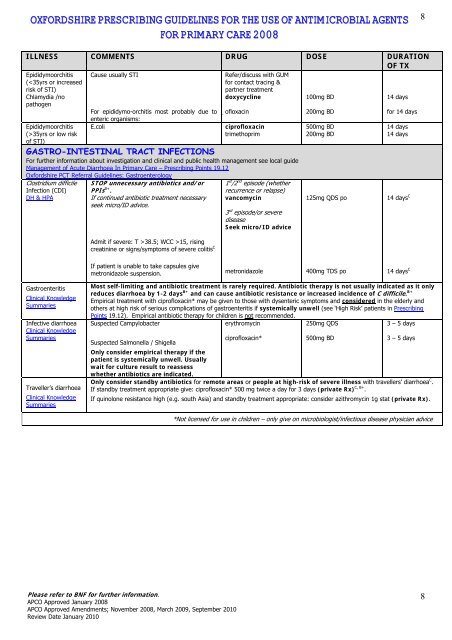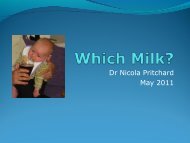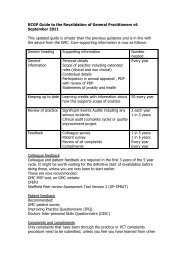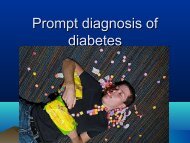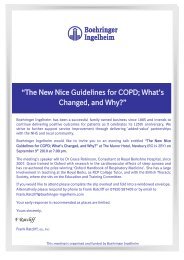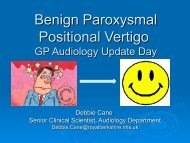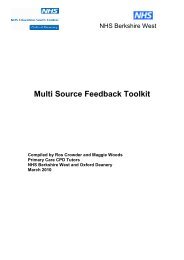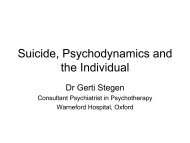Oxfordshire Primary Care Antimicrobial Prescribing Guidelines up ...
Oxfordshire Primary Care Antimicrobial Prescribing Guidelines up ...
Oxfordshire Primary Care Antimicrobial Prescribing Guidelines up ...
You also want an ePaper? Increase the reach of your titles
YUMPU automatically turns print PDFs into web optimized ePapers that Google loves.
OXFORDSHIRE PRESCRIBING GUIDELINES FOR THE USE OF ANTIMICROBIAL AGENTS<br />
FOR PRIMARY CARE 2008<br />
8<br />
ILLNESS COMMENTS DRUG DOSE DURATION<br />
OF TX<br />
Epididymoorchitis<br />
(35yrs or low risk<br />
of STI)<br />
Cause usually STI<br />
For epididymo-orchitis most probably due to<br />
enteric organisms:<br />
E.coli<br />
Refer/discuss with GUM<br />
for contact tracing &<br />
partner treatment<br />
doxycycline<br />
ofloxacin<br />
ciprofloxacin<br />
trimethoprim<br />
GASTRO-INTESTINAL TRACT INFECTIONS<br />
For further information about investigation and clinical and public health management see local guide<br />
Management of Acute Diarrhoea In <strong>Primary</strong> <strong>Care</strong> – <strong>Prescribing</strong> Points 19.12<br />
<strong>Oxfordshire</strong> PCT Referral <strong>Guidelines</strong>: Gastroenterology<br />
Clostridium difficile<br />
Infection (CDI)<br />
DH & HPA<br />
STOP unnecessary antibiotics and/or<br />
PPIs B+ .<br />
If continued antibiotic treatment necessary<br />
seek micro/ID advice.<br />
Admit if severe: T >38.5; WCC >15, rising<br />
creatinine or signs/symptoms of severe colitis C<br />
1 st /2 nd episode (whether<br />
recurrence or relapse)<br />
vancomycin<br />
3 rd episode/or severe<br />
disease<br />
Seek micro/ID advice<br />
100mg BD<br />
200mg BD<br />
500mg BD<br />
200mg BD<br />
125mg QDS po<br />
14 days<br />
for 14 days<br />
14 days<br />
14 days<br />
14 days C<br />
If patient is unable to take capsules give<br />
metronidazole suspension.<br />
metronidazole<br />
400mg TDS po<br />
14 days C<br />
Gastroenteritis<br />
Clinical Knowledge<br />
Summaries<br />
Infective diarrhoea<br />
Clinical Knowledge<br />
Summaries<br />
Traveller’s diarrhoea<br />
Clinical Knowledge<br />
Summaries<br />
Most self-limiting and antibiotic treatment is rarely required. Antibiotic therapy is not usually indicated as it only<br />
reduces diarrhoea by 1-2 days B+ and can cause antibiotic resistance or increased incidence of C difficile. B+<br />
Empirical treatment with ciprofloxacin* may be given to those with dysenteric symptoms and considered in the elderly and<br />
others at high risk of serious complications of gastroenteritis if systemically unwell (see ‘High Risk’ patients in <strong>Prescribing</strong><br />
Points 19.12). Empirical antibiotic therapy for children is not recommended.<br />
Suspected Campylobacter<br />
erythromycin<br />
250mg QDS<br />
3 – 5 days<br />
Suspected Salmonella / Shigella<br />
Only consider empirical therapy if the<br />
patient is systemically unwell. Usually<br />
wait for culture result to reassess<br />
whether antibiotics are indicated.<br />
ciprofloxacin*<br />
500mg BD<br />
3 – 5 days<br />
Only consider standby antibiotics for remote areas or people at high-risk of severe illness with travellers’ diarrhoea C .<br />
If standby treatment appropriate give: ciprofloxacin* 500 mg twice a day for 3 days (private Rx) C, B+ .<br />
If quinolone resistance high (e.g. south Asia) and standby treatment appropriate: consider azithromycin 1g stat (private Rx).<br />
*Not licensed for use in children – only give on microbiologist/infectious disease physician advice<br />
Please refer to BNF for further information.<br />
APCO Approved January 2008<br />
APCO Approved Amendments; November 2008, March 2009, September 2010<br />
Review Date January 2010<br />
8


